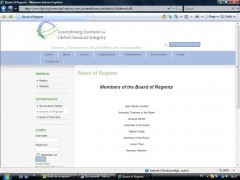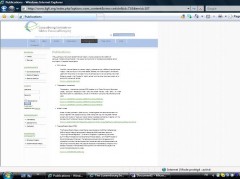10/24/2009
LIGFI snubs and disregards TJN and GFI
I have posted a couple of articles about LIGFI to observe it is an empty shell with a deceptive goal that was launched in a jurisdiction:
- where critics are repudiated (Cf. censorship of a report after pressure and threats),
- where regulation is perfectible because of the conflicts of interests and the direct say of professionals in the drawing up of laws and regulations that are applicable to them, which is practically an assent,
It is amazing to observe that 3 members out of 4 of the board of regents are both Luxembourgish and politicians (Jean-Claude Juncker, Jacques Santer and Lucien Thiel). The last member is Swiss.
LIGFI remains an empty shell despite the first articles are online on its website.
“What we all are missing are facts, rather than the continuous outflow of innuendos, unsubstantiated attacks and emotional outbreaks”, an article posted this week says.
Let’s see facts just on the LIGFI website to analyse the culture behind the project:
The “Publications” page starts with these words: The Luxembourg Institute for Global Financial Integrity will post publications that it deems of particular interest and significance in the support and promotion of professional excellence, ethics and integrity in the global financial sector.
And they list :
CFA Institute
The CFA Institute Centre for Market Integrity published so far in 2009 six Financial Market Integrity Index Surveys on the United States, Canada, the United Kingdom, Switzerland, Japan and Hong Kong. On a scale of one (not ethical at all) to five (very ethical), the United States is scored in the 2 range for “slightly ethical” and the other countries typically at or around 3 for “somewhat” ethical.
http://www.cfapubs.org/loi/ccb
Transparency International
Transparency International published 2009 updates to its Global Corruption Barometer (GCB), Corruption Perceptions Index (CPI) and Briber Payers Index (BPI). All three documents paint an unsatisfactory picture of the levels of corruption that prevail around the world.
http://www.transparency.org/policy_research/surveys_indices/gcb
http://www.transparency.org/policy_research/surveys_indices/cpi
http://www.transparency.org/policy_research/surveys_indices/bpi
Global Witness
Global Witness published in 2009 its study “Undue Diligence: How banks do business with corrupt regimes” that highlights corrupt funds finding their way into the global financial system and the lack of resolve of certain banks to address compliance in dealing with the sources of such funds given the lack or ambiguity of regulation and law.
http://www.globalwitness.org/media_library_detail.php/735/en/undue_diligence_how_banks_do_business_with_corrupt
Financial Stability Board (FSB)
The Financial Stability Board, whose Charter was endorsed by the G20 at the September 2009 Pittsburgh meeting, has published in September 2009 three recent reports on “Improving Financial Regulation”, “Overview of Progress in Implementing, the London Summit Recommendations for Strengthening Financial Stability”, and “FSB Principles for Sound Compensation Practices”. The reports are a forewarning to the regulatory and oversight environment that banking and other financial services worldwide can expect over the coming months and years. They capture the political will expressed by the G20 to firmly address the issues of financial behavior and systemic risk that are the root cause of the current financial and economic crises. http://www.financialstabilityboard.org/
Comments
1. They use an interesting report from the CFA Institute but in a biased perspective as the study focuses on big jurisdictions whereas many issues relating to money laundering tax evasion and/or fraud in a general rule are in small jurisdictions.
2. LIGFI write that Transparency International published 2009 updates to its Global Corruption Barometer (GCB), Corruption Perceptions Index (CPI) and Briber Payers Index (BPI). They ignore that the CPI no longer exists as I explained.
3. To be honest, they quote Global Witness that published a report that is critical for Luxembourg.
4. Finally, the Financial Stability Board, which is successor to the Financial Stability Forum, was established in April 2009 following the 2009 G-20. It comprises senior representatives of national financial authorities (central banks, regulatory and supervisory authorities and ministries of finance), international financial institutions, standard setting bodies, and committees of central bank experts. It is therefore vulnerable to “political games” like the OECD.
But above all, three major actors in the debate are missing in the list:
Global Financial Integrity. As the LIGFI team members live in the bowl they did not know that a body with similar title already exist since September 2006. Global Financial Integrity promotes national and multilateral policies, safeguards, and agreements aimed at curtailing the cross-border flow of illegal money. In putting forward solutions, facilitating strategic partnerships, and conducting groundbreaking research, GFI is leading the way in efforts to curtail illicit financial flows and enhance global development and security. This body has just completed a conference on “Increasing Transparency in Global Finance: A Development Imperative”.
Tax Justice Network promotes transparency in international finance and opposes secrecy. We support a level playing field on tax and we oppose loopholes and distortions in tax and regulation, and the abuses that flow from them. They promote tax compliance and they oppose tax evasion, tax avoidance, and all the mechanisms that enable owners and controllers of wealth to escape their responsibilities to the societies on which they and their wealth depend. Tax havens, or secrecy jurisdictions as we prefer to call them, lie at the centre of their concerns, and they oppose them. They just launched their website for the Mapping the Faultlines project (see www.secrecyjurisdictions.com), which explores the furtive world of secrecy jurisdictions where furtive types get up to all sorts of dubious business and another website (see www.financialsecrecyindex.com) which takes reader step-by-step into the details of their new ranking of secrecy jurisdictions. The ranking results will be published early November.
The Task Force on Financial Integrity and Economic Development is a consortium of Governments and NGOs that focuses on achieving greater transparency in the global financial system for the benefit of developing countries. It addresses the inequalities in the global financial system that penalize billions of people, and will advocate for greatly improved transparency and accountability
In a nutshell, according to LIGFI none of the above powerhouses in the debate - that proved reliable contrary to LIGFI - deems of particular interest and significance in the support and promotion of professional excellence, ethics and integrity in the global financial sector.
16:08 Posted in Luxembourg | Permalink | Comments (0)
10/22/2009
Games theory with Luxembourg
Yesterday I quoted European Tax Commissioner Laszlo Kovacs who said that the actions of Austria and Luxembourg were hampering progress in cracking down on global tax fraud, an issue he said was “high on the political agenda of the EU.
The question is: what is to be done to achieve the goal of automatic exchange?
I have an idea: the services of clearing house are done in Luxembourg by Clearstream. Clearstream International was formed in January 2000 through the merger of Cedel International and Deutsche Börse Clearing.
I suggest that EU governements encourage their banks to chose another clearing house for the clearing services, in a jurisdiction that play the truth and fair competition game.

05:49 Posted in Luxembourg | Permalink | Comments (0)
10/20/2009
Clearing the clearing, regulating the regulator
Late July I announced the launch of a personal project that appears to be complementary to the one of TJN.
The last paragraph of my article was: On a subsidiary basis, for the jurisdictions which lodge an activity of general interest for the international financial sector (for example, clearing), will be posed logically and practically the question of the relevance of the maintenance of the activity if it appears a deficit of regulation compared to what is done in the other jurisdictions
A trial is currently taking place before the French court. It involves a Luxembourg-based Company that is called Clearstream. Clearstream is a clearing house like its competitor Euroclear. It is amazing to observe that both clearing houses are located in secrecy jurisdictions: according to TJN, Luxembourg is scored 87% secrecy and Belgium is scored 73% secrecy.
TJN assessment relates to 12 indicators reflecting the legal and financial arrangements of the jurisdiction (Key Financial Secrecy Indicators, KFSI):
1. Is legal banking secrecy banned (i.e. Is there no legal right to banking secrecy)? (OK for Belgium)
2. Is there a Public Trust and Foundations Registry?
3. Does the FATF rate 90% largely compliant and with no non-compliant ratings?
4. Are company accounts available for inspection by anyone for a fee of less than US$10? (OK for Luxembourg)
5. Are details of the beneficial ownership of companies available on public record online for less than US$10?
6. Are details of the beneficial ownership of companies submitted to and kept updated by a competent authority?
7. Did the jurisdiction participate in the TJN Survey in 2009 (1=both questionnaires; 0.5 one questionnaire)? (OK for Luxembourg)
8. Does the jurisdiction fully participate in Automatic Information Exchange (the European Savings Tax Directive)?
9. Has the jurisdiction at least 60 bilateral treaties providing for broad information exchange clauses covering all tax matters (either DTA or TIEA)? (OK for Belgium)
10. Has the jurisdiction's authority effective access to bank information for information exchange purposes?
11. Does the jurisdiction prevent company redomiciliation?
12. Does the jurisdiction prevent protected cell companies from being created in its territory? (OK for Belgium)
Clearing is definitely an activity of general interest for the international financial sector. As Clearstream explains, the world's entire financial system is built on trust. When assets are traded, both parties must be sure they will receive their part of the transaction. Given the complexity, speed and quantity of assets involved, a fast, secure and trusted third-party is absolutely essential for settling transactions. The business of a clearing house is therefore to ensure that cash and securities are promptly and effectively delivered between trading parties. It also manages, safekeeps and administers the securities that it holds on behalf of its customers.
It results that every financial flow uses such services including criminal flows.
The question is: should such services be born by the private sector?
I would say definitely no, especially if there is a weak regulation in the jurisdiction where the clearing house is located.
The experience in Luxembourg corroborates the need to “supra-nationalize” the activity under the supervision of an international body (OECD, IMF…).
Clearstream is a PSF (Professional of the Financial Sector) that is regulated by the CSSF.
The regulator is a stakeholder in the promotion of the jurisdiction
The Law of 23 December 1998 establishing a financial sector supervisory commission (“Commission de surveillance du secteur financier”), as amended, states:
Art. 3. The CSSF shall:
(a) examine all requests from undertakings or persons seeking to establish themselves in the Grand Duchy of Luxembourg to engage in one or more of the activities enumerated in Article 2 which require authorisation from the Minister responsible for the CSSF;
(b) carry out prudential supervision of undertakings and persons coming under its authority in accordance with the laws and regulations governing such supervision;
(c) coordinate the implementation of government initiatives and measures aimed at achieving an orderly expansion of the activities of the financial sector in the Grand Duchy of Luxembourg;
(d) monitor dossiers and participate in negotiations at a Community and international level relating to problems affecting the financial sector;
(e) present to the Government any suggestions likely to improve the financial sector’s legislative and regulatory environment;
(f) examine any other question relating to financial activities which the Minister responsible for the CSSF might submit to it.
This situation had been pointed out with relevance by the Commission that was mandated to determine solutions to fight the crisis. « le rôle de la CSSF, défini à l’époque comme celui non seulement d’un contrôleur du secteur financier mais encore d’un promoteur de la place doit être revu afin d’éviter tout équivoque sur sa mission essentielle qui est celle de la surveillance prudentielle » (free translation : “the role of the CSSF, defined at the time as both a controller of the financial sector and as a promoter of the financial center, must be re-examined in order to avoid any ambiguity on its essential mission which is that of the prudential monitoring”) (In report « Vers un nouveau modèle de croissance », 23 March 2009, page 13)
What has been done? Nothing.
Does the CSSF require the change? No.
Professionals in Luxembourg do not provide an opinion on laws and regulation that are applicable to them: it is actually an assent.
Article 3 is very interesting when one keeps in mind what Rafik Fischer stated and what the CSSF confirms on its website.
- “The Luxembourg Investment Fund Industry has regularly had a very CLOSE AND DIRECT SAY on the evolution of the Luxembourg prudential regulatory environment governing the collective Investment Industry (...) This INFLUENCE has been exerted directly and indirectly by the LOBBYING initiatives taken on the level of the different professional associations, be it ALFI or ABBL , but also and more importantly, trough a DIRECT ASSOCIATION with the Luxembourg Supervisory Authorities by means of a number of standing committees" (Cf. Rafik Fischer, « Shaping the regulatory environment ». Fundlook, July 2005, page 6);
- "The internal committees assist the CSSF in the analysis of the development of the different financial sector segments, give their advice on any question relating to their activities and participate in the DRAWING-UP and the INTERPRETATION of regulations relating to their specific field."(Cf. Site internet de la CSSF, page « Comités internes »).
Article 3 must be rephrased in this perspective.
The CSSF shall
(a) examine all requests from undertakings or persons seeking to establish themselves in the Grand Duchy of Luxembourg to engage in one or more of the activities enumerated in Article 2 which require authorisation from the Minister responsible for the CSSF;
(b) carry out prudential supervision of undertakings and persons coming under its authority in accordance with the laws and regulations governing such supervision for which regulated entities had a very close and direct say in the drawing up and the interpretation of regulations relating to their specific field;
(c) coordinate with different professional associations, be it ALFI or ABB,L the implementation of government initiatives and measures aimed at achieving an orderly expansion of the activities of the financial sector in the Grand Duchy of Luxembourg;
(d) monitor dossiers and participate in negotiations at a Community and international level relating to problems affecting the financial sector;
(e) present to the Government any suggestions likely to improve the financial sector’s legislative and regulatory environment resulting from lobbying initiatives taken on the level of the different professional associations, be it ALFI or ABBL , but also and more importantly, from a direct association with by means of a number of standing committees;
(f) examine with different professional associations, be it ALFI or ABB,L any other question relating to financial activities which the Minister responsible for the CSSF might submit to it.
This is actually how works the regulated jurisdiction of Luxembourg.
I do not think this is the regulated entities’ role to have a very CLOSE AND DIRECT SAY on the evolution of the Luxembourg prudential regulatory environment that is opposable to them, and to exert directly and indirectly LOBBYING initiatives. Such “close and direct say” and “influence” and “direct association “apply not only for the regulator bus as well for the parliament (many members of parliament are business lawyers).
The direct consequence is the delay to transpose Recs or regulations despite international commitments.
A very good current example is the difficulty to enforce the criminal liability of legal persons whereas it was possible to change the constitution in a couple of weeks.
The result is that in case of trial (money laundering, fraud…) courts in Luxembourg cannot use legal provisions that are delayed. In other words, the crime does not exist because of the CLOSE AND DIRECT SAY and LOBBYING and DIRECT ASSOCIATION.
After the generous grant to the FATF which is in situation exactly as if a Court received a generous grant from a litigant it is gonna judge, a commission tender received a generous grant from a tender it is gonna assess, an auditor received a generous grant from an auditee it is gonna audit…, Luxembourg has imagined a regulation that is as if auditees had a close and direct say on how the auditors must work…
By the way, it is about to be the case. The CSSF bases its work on audit reports. The draft law to transpose the 8th directive on audit as modified appoints the CSSF for the public supervision of auditors (An ad to hire staff is online on the CSSF website)
The situation will be: professionals will be controlled by auditors that will be controlled by the CSSF that will be controlled by professionals that will control themselves in fine.
Don’t you smell the coffee?
I personally do.
05:44 Posted in Luxembourg | Permalink | Comments (1)








